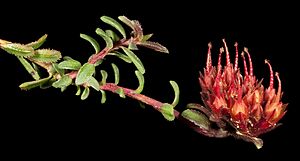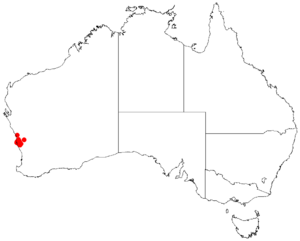Darwinia sanguinea facts for kids
Quick facts for kids Darwinia sanguinea |
|
|---|---|
 |
|
| Scientific classification |
|
| Kingdom: | Plantae |
| Clade: | Tracheophytes |
| Clade: | Angiosperms |
| Clade: | Eudicots |
| Clade: | Rosids |
| Order: | Myrtales |
| Family: | Myrtaceae |
| Genus: | Darwinia |
| Species: |
D. sanguinea
|
| Binomial name | |
| Darwinia sanguinea (Meisn.) Benth.
|
|
 |
|
| Occurrence data from AVH | |
| Script error: The function "autoWithCaption" does not exist. | |
Script error: No such module "Check for conflicting parameters".
Darwinia sanguinea is a special plant that belongs to the myrtle family, called Myrtaceae. It is found only in Western Australia, meaning it is endemic there. This plant is a type of shrub that grows low to the ground.
Contents
Discovering Darwinia sanguinea
This unique plant was first described by a botanist named Ferdinand von Mueller in 1865. He gave it the scientific name Darwinia sanguinea. The name Darwinia honors Dr. Erasmus Darwin, who was the grandfather of the famous Charles Darwin. The word sanguinea comes from Latin and means "blood-red," which likely refers to the plant's beautiful flowers.
What Does it Look Like?
Darwinia sanguinea is a small, spreading shrub. It usually grows very low, like a carpet, reaching a height of only about 5 to 20 centimeters (2 to 8 inches). This makes it a great groundcover plant.
Its Flowers
One of the most striking features of this plant is its flowers. They are a lovely red-purple color. These vibrant flowers bloom during the spring and early summer months in Australia, typically from August to December. They add a splash of color to the landscape.
Where Does it Live?
You can find Darwinia sanguinea in the Wheatbelt region of Western Australia. It likes to grow on hills and sandy plains.
Preferred Habitat
This plant thrives in sandy soils that are often found over a type of rock called laterite. It grows in areas between towns like Coorow, Carnamah, and Dandaragan. These specific conditions help Darwinia sanguinea grow well in its native home.
 | Jewel Prestage |
 | Ella Baker |
 | Fannie Lou Hamer |

